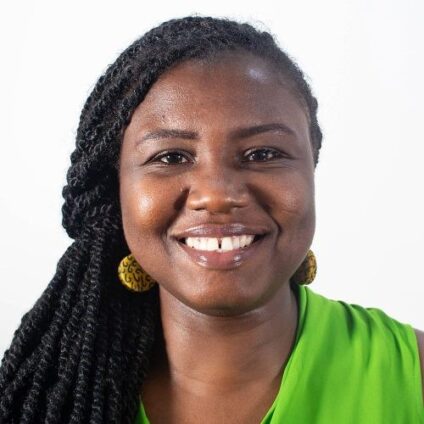Addressing the audience at the "Beyond Electrocracy" Webinar Series organized by the Centre for Alternative Politics and Security West Africa on November 22, 2024, Mrs Mavis Zupork Dome, a senior research analyst at the Centre for Democratic Development (CDD), emphasized in her presentation the urgent need for inclusive and participatory governance in Ghana.
Speaking on the topic, "Beyond Ghana’s 2024 Elections: Business as Usual or a New Pathway Towards People-Centered Politics", Mrs Dome stressed the rising dissatisfaction among Ghanaians with democracy and its workings.
Focusing on Afrobarometer surveys, Mrs Dome highlighted troubling trends. “Over 32 years of democracy, we are seeing a decline in satisfaction with how democracy works in Ghana,” she said.
According to the data, satisfaction rates have dropped from 51% in 2020 to significantly lower levels in 2022. Similarly, perceptions of Ghana as a full democracy have fallen sharply, with 61% of citizens now describing the country as a democracy with major problems.
Mrs Dome pointed out that while Ghanaians cherish political freedoms, including the ability to vote and express opinions, these rights have not translated into active participation in governance. "Only 20% of citizens attend community meetings, and even fewer engage with government officials or elected representatives," she noted.
Corruption, economic challenges, and the growing perception of inequality were also highlighted as key barriers. "The data shows that 74% of Ghanaians believe corruption levels have increased, while poverty rates have surged from 17% in 2017 to 45% in recent years," she revealed. These challenges, Dome argued, are driving widespread disillusionment with democracy.
Calling for innovative solutions, she proposed a transformative framework for governance that prioritizes citizen involvement. “We must think about affirmative action, resource allocation, and monitoring and evaluation to empower marginalized groups and civil society,” she emphasized.
Technology, she argued, could play a pivotal role in bridging the gap between citizens and governance. “With the growing access to smartphones and the internet, we can leverage digital platforms to disseminate information, engage citizens, and establish grievance mechanisms,” she said.
Mrs. Dome concluded with a passionate plea for a shift from manifesto-driven politics to sustained civic engagement. “It is no longer enough for politicians to present manifestos every four years,” she said. “We need a governance system that actively involves citizens in the decision-making process and empowers them to take ownership of the country’s development.”
Latest Stories
-
KNUST health sciences graduates urged to uphold integrity in leadership
23 mins -
16 missing after Red Sea tourist boat sinks
29 mins -
Angela Merkel defends ties with Russia and blocking Ukraine from Nato
33 mins -
Right to Dream are filling ‘the big gap’ in Ghana – UG Director of Sports
1 hour -
Prosecutor drops federal criminal cases against Trump
1 hour -
Asante Kotoko removes Prosper Ogum from Interim Management Committee
1 hour -
Karen Hendrickson listed among Ghana’s 100 Most Influential People for 2024
1 hour -
Emirates relieved as colleague returns safely after alleged kidnapping
1 hour -
Right to Dream unveils monument to celebrate silver jubilee
2 hours -
Developed countries commit $300bn annually to boost climate finance
2 hours -
Stratcomm Africa celebrates 30 years with inspiring Women S.H.A.R.E. anniversary event
2 hours -
26 arrested for brandishing, indiscrimimately firing toy guns in public
2 hours -
CHRAJ report confirms National Cathedral is a taxpayer-funded project – Ablakwa
2 hours -
Hotjobs Africa CEO, Chief Emmanuel Mefful honoured as one of ‘Ghana’s 100 Most Influential People’ in 2024
3 hours -
H&M Manufacturing Limited CEO Charles Hanna named recipient of 100 Most influential People Awards, 2024
3 hours

